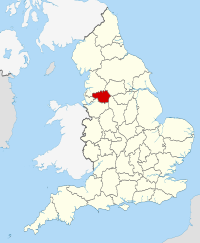Greater Manchester Combined Authority
| Greater Manchester Combined Authority | |
|---|---|
 |
|

Greater Manchester within England
|
|
| Type | |
| Type | |
| Houses | Unicameral |
|
Term limits
|
None |
| History | |
| Founded | 1 April 2011 |
| Preceded by | AGMA |
| Leadership | |
|
Tony Lloyd
Since 29 May 2015 |
|
| Structure | |
| Seats | 11 members |
 |
|
|
Political groups
|
|
| Elections | |
| Indirect election, directly elected mayor from 2017 | |
| Meeting place | |
 |
|
|
Churchgate House, Oxford Road, Manchester |
|
| Website | |
| https://www.greatermanchester-ca.gov.uk/ | |
The Greater Manchester Combined Authority (GMCA) is the combined authority of Greater Manchester, England. It was established on 1 April 2011 and consists of eleven indirectly elected members, each a directly elected councillor from one of the ten metropolitan boroughs that comprise Greater Manchester together with the interim Mayor of Greater Manchester. The authority derives most of its powers from the Local Government Act 2000 and Local Democracy, Economic Development and Construction Act 2009, and replaced a range of single-purpose joint boards and quangos to provide a formal administrative authority for Greater Manchester for the first time since the abolition of the Greater Manchester County Council in 1986.
The planning policies of the GMCA were developed in the 2000s by the Association of Greater Manchester Authorities in the Greater Manchester Strategy. It is a strategic authority with powers over public transport, skills, housing, regeneration, waste management, carbon neutrality and planning permission. Functional executive bodies, such as Transport for Greater Manchester, are responsible for delivery of services in these areas. The GMCA appoints a Chair and Vice-Chairs, from among its ten executive members.
The costs of the Greater Manchester Combined Authority that are reasonably attributable to the exercise of its functions relating to public transport, economic development and regeneration (and any start up costs) are met by its constituent councils. Such costs are funded by direct government grant and, as a precepting authority, with some money collected with local Council Tax apportioned between the constituent councils.
...
Wikipedia
